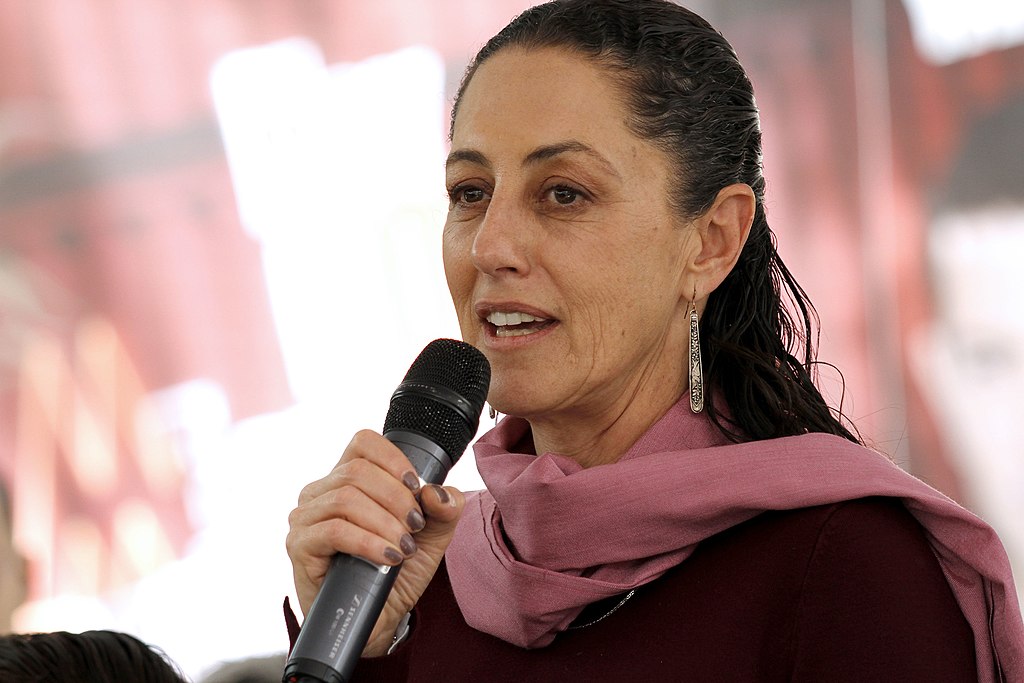Mexican President Claudia Sheinbaum has reportedly agreed to halt the facilitation of migrant caravans entering the United States. The decision follows a high-stakes diplomatic standoff after former U.S. President Donald Trump threatened to impose a 25% tariff on Mexican imports. This development could signal a turning point in migration policies and U.S.-Mexico relations.
A High-Stakes Agreement
Under intense pressure from Trump, Sheinbaum’s administration has committed to curbing the movement of large-scale migrant caravans through Mexican territory. This move is expected to significantly reduce the number of asylum-seekers and undocumented migrants attempting to cross the U.S.-Mexico border.
The threat of a steep tariff on Mexican goods, which Trump announced during a fiery speech last week, was a key factor in accelerating Mexico’s decision. Economists estimated that a 25% tariff could cost Mexico billions in trade revenue, dealing a severe blow to its economy.
Sheinbaum, who recently took office, has positioned herself as a progressive leader willing to collaborate on migration issues. However, critics have expressed concerns over the humanitarian implications of restricting caravan movements, particularly for vulnerable populations fleeing violence and poverty in Central America.
U.S.-Mexico Relations in Focus
Trump hailed the agreement as a “win for American sovereignty” during a press conference on Tuesday. He credited his hardline stance for pressuring Mexico to take action and emphasized the importance of securing the southern border.
Political analysts, however, remain divided. While some view the agreement as a necessary step to address border security, others argue it could exacerbate the humanitarian crisis. Migrant advocacy groups have voiced strong opposition, warning that the policy could lead to increased suffering for those stranded in Mexico without access to shelter or resources.
Sheinbaum’s administration, in response to criticism, has promised to invest in migrant shelters and bolster efforts to address the root causes of migration.
Social Media Reacts
News of the agreement has sparked widespread debate on social media, with opinions ranging from praise to condemnation:
- @BorderSecurityNow: “Finally! Mexico stepping up to stop these caravans. Trump’s tariff threat was a genius move.”
- @HumanRights4All: “This agreement is a disaster for migrant families. They’re fleeing violence, not looking for handouts.”
- @PolicyWatcher2024: “Sheinbaum is stuck between a rock and a hard place. Tariffs or humanitarian backlash—what a mess.”
- @TrumpSupporter99: “This is why Trump is the GOAT. He knows how to negotiate and win big for America.”
- @LatAmAdvocate: “Mexico’s decision shows how much economic pressure the U.S. can exert. But at what cost to human lives?”
- @NeutralObserver: “Both sides need to prioritize humane solutions. Migrants aren’t pawns in a political chess game.”
Implications for the Future
As Mexico moves to implement its new policy, the U.S. is expected to monitor its impact on border crossings closely. The agreement marks a significant shift in bilateral relations, reflecting the growing importance of migration in political and economic negotiations.
While Trump’s tariff threat has successfully compelled action, questions remain about the sustainability and ethics of using economic leverage to address complex humanitarian issues. For now, the focus will be on whether this deal leads to meaningful change—or further controversy.



 AI is already creeping into election campaigns. NZ’s rules aren’t ready
AI is already creeping into election campaigns. NZ’s rules aren’t ready  UK Accepts U.S. Request to Use British Bases for Defensive Strikes on Iranian Missiles
UK Accepts U.S. Request to Use British Bases for Defensive Strikes on Iranian Missiles  Trump Warns Iran as Gulf Conflict Disrupts Oil Markets and Global Trade
Trump Warns Iran as Gulf Conflict Disrupts Oil Markets and Global Trade  Pentagon Leaders Monitor U.S. Iran Operation from Mar-a-Lago
Pentagon Leaders Monitor U.S. Iran Operation from Mar-a-Lago  Iran Supreme Leader Ayatollah Ali Khamenei Killed in Israeli, U.S. Strikes: Reuters
Iran Supreme Leader Ayatollah Ali Khamenei Killed in Israeli, U.S. Strikes: Reuters  Zelenskiy Urges Change in Iran After U.S. and Israeli Strikes, Cites Drone Support for Russia
Zelenskiy Urges Change in Iran After U.S. and Israeli Strikes, Cites Drone Support for Russia  Israel Strikes Hezbollah Targets in Lebanon After Missile and Drone Attacks
Israel Strikes Hezbollah Targets in Lebanon After Missile and Drone Attacks  Macron Urges Emergency UN Security Council Meeting as US-Israel Strikes on Iran Escalate Middle East Tensions
Macron Urges Emergency UN Security Council Meeting as US-Israel Strikes on Iran Escalate Middle East Tensions  Does international law still matter? The strike on the girls’ school in Iran shows why we need it
Does international law still matter? The strike on the girls’ school in Iran shows why we need it  EU Urges Maximum Restraint in Iran Conflict Amid Fears of Regional Escalation and Oil Supply Disruption
EU Urges Maximum Restraint in Iran Conflict Amid Fears of Regional Escalation and Oil Supply Disruption  Middle East Conflict Escalates After Khamenei’s Death as U.S., Israel and Iran Exchange Strikes
Middle East Conflict Escalates After Khamenei’s Death as U.S., Israel and Iran Exchange Strikes  Marco Rubio to Brief Congress After U.S.-Israeli Strikes on Iran
Marco Rubio to Brief Congress After U.S.-Israeli Strikes on Iran  Trump to Address Nation as U.S. Launches Strikes in Iran, Axios Reports
Trump to Address Nation as U.S. Launches Strikes in Iran, Axios Reports  Trump Announces U.S. Strikes on Iran Navy as Conflict Escalates
Trump Announces U.S. Strikes on Iran Navy as Conflict Escalates  Israel Launches Fresh Strikes on Iran After Death of Supreme Leader Ayatollah Khamenei
Israel Launches Fresh Strikes on Iran After Death of Supreme Leader Ayatollah Khamenei  Trump Says U.S. Attacks on Iran Will Continue, Warns of More American Casualties
Trump Says U.S. Attacks on Iran Will Continue, Warns of More American Casualties  U.S.-Israel Strike on Iran Escalates Middle East Conflict, Trump Claims Khamenei Killed
U.S.-Israel Strike on Iran Escalates Middle East Conflict, Trump Claims Khamenei Killed 































